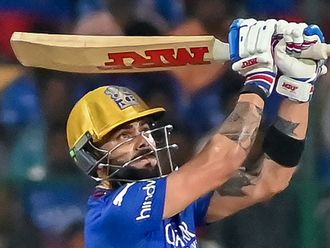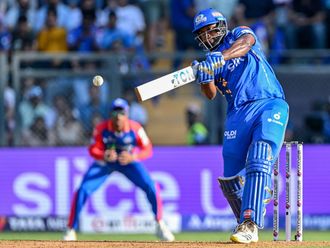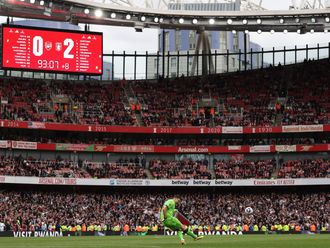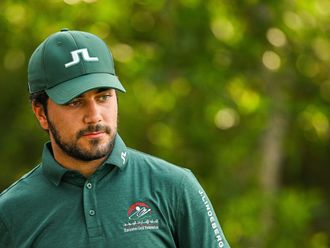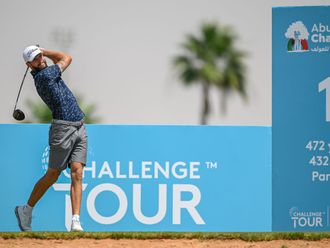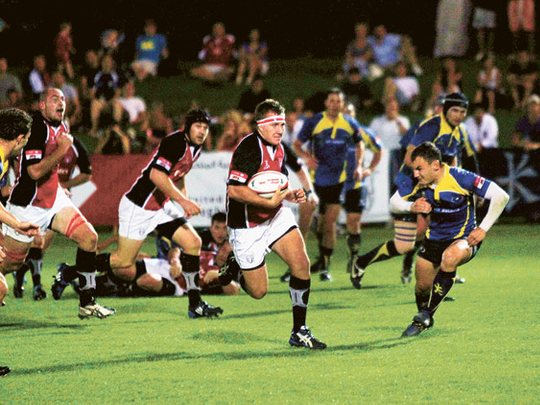
Abu Dhabi: Winning their first competitive home fixture 24-10 against Kazakhstan in the Asian Five Nations on Friday night, the four-month-old UAE national rugby team has entered world rugby kicking and screaming.
With Rugby Sevens becoming an Olympic sport the regionally collective Arabian Gulf Rugby Football Union (AGRFU) had to be disbanded, but despite the resulting decrease in catchment area, the UAE is proving it can stand on its own two feet.
Asian Five Nations Top Five survival would prove that the game here has emerged from the transition well, but as UAE Rugby Football Union CEO Ian Bremner points out, it's just the first step in a massive journey to re-develop the game from the ground up using more sustainable home-grown talent.
As Bremner exclusively told Gulf News, the transformation is only just beginning.
GULF NEWS: What are the long and short term targets?
IAN BREMNER: Our strategic plan focuses on four key areas: governance and finance, business development, communication of growing the game and high performance.
We've represented this four-year vision to the Asian Rugby Football Union (ARFU). We've also presented evidence of finances to prove we're non-governmental.
We hope to be full members of ARFU in 12 months and the International Rugby Board (IRB) by 2013.
We aim to become a respected organisation within world and regional rugby embracing all ethnicity, age and ability.
Four months into being fully operational these are the foundations of how we want to move forward. It's now a matter of identifying what we consider achievable in year one.
With other GCC Unions slower to take off, was the break-up of the AGRFU detrimental to the growth of the game in this region?
The splitting of the AGRFU was inevitable when Rugby Sevens was accepted in the Olympics.
The AGRFU was an anomalous organisation and we had to break into countries.
The sooner that happened the more time individual unions like ourselves had to develop our capabilities.
There was no choice. But one door closes, another opens. From this, strong unions will form, opportunities are still there and the split means it's an opportunity for more people.
We may have some Omani, Bahraini or Qatari-based players who can no longer play with this team at this level but it gives a chance to another pool of players inside the UAE, particularly UAE nationals.
You also have a new identity that sponsors and the government will want to back. Are you enjoying more funds than the AGRFU?
Absolutely not, we are starting from scratch.
We are particularly thankful to the Ministry of Youth and Sports who have provided initial core funding but we've not enjoyed the IRB funding or Dubai Sevens revenue that our predecessors enjoyed.
In fact we're enjoying considerably less. We're confident of attracting funds through our performances and realise we have to earn the right for this support.
The AGRFU was healthy, self-sufficient and producing good results, have we taken two steps back to take one forward?
We've inherited a good competitive programme and structure but there were shortcomings in the development process in that no Emiratis were engaged in the game whatsoever.
It was extremely disproportionate in terms of expats and locals. It's a key goal for us to grow the game amongst the local population and address that balance.
We have a model whereby the top end of the game is well defined and managed but we don't have pathways leading into that.
With the model we've inherited we're just waiting for people to come into the country and qualify for eligibility then they move on or the kids coming up go abroad for university.
That's no way to long term plan any business or sport, particularly a national sports body.
So how will you develop pathways into the sport?
Our thinking hasn't totally crystallised on the systems we are going to use but we hope to employ some unique developmental pathways in terms of growing the game.
A lot of people talk about broadening the base but we are going to look at very specific vertical pathways where kids move from school to school.
We're taking a broad glance at what everyone else is doing to grow the game but at the same time we're looking at what suits the local sports culture — what works elsewhere might not work here.
There was talk of growing the game through the Armed Forces?
We have no Emirati schools playing rugby at present so talking about setting up academies and using the armed forces as a vehicle is a little bit premature.
The first priority is to get the game established in a sustainable way in Emirati schools and not lose any ground on where we are with clubs and expat schools.
Our club and domestic structure is extremely well organised at youth level and they will become destinations for the work that we do in Emirati schools.
Everyone has a head start on us so we need to seize all the opportunities available to us.
We can't do it quickly enough because we have a lot of catching up to do.
How long before we have an Emirati icon to help grow the game?
Our game isn't big enough here at the moment to produce iconic figures because we don't have that type of intensity of media coverage.
I think in two years I'd like to think we have school players who'll watch adult games and look up to Emiratis in the team.
Is the local sports culture here really ready to embrace rugby?
Emirati youngsters have to be introduced to the game and it has to be an enjoyable experience, it has to be an enriching experience and they have to feel an affiliation to the game.
That opportunity hasn't been provided before. We have the infrastructure and resources to make this happen. We don't see any shortcomings.
We've no doubt there is enough enthusiasm here among Emiratis in the current cohort of participants and within the local population for this game to grow.
We represent the largest playing nation in the region and can become a lead body for west Asia.
All this change came about due to the Olympics. Is getting there now the target?
If we have the potential of an all-Emirati team playing in the Olympics the prospect is nothing other than exciting.
But it's also one that we can't dream of just now.
We do not have an Emirati team.
How quickly we can improve depends on how quickly our set-up can become professional.
The biggest setback at the moment is that our players are amateur, they juggle their sport around their day jobs.
Four months into this project a lot of things have to happen before we can think about that.


